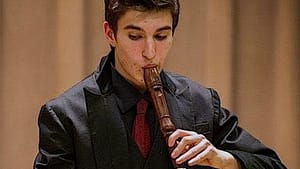Stay in the Loop
BSR publishes on a weekly schedule, with an email newsletter every Wednesday and Thursday morning. There’s no paywall, and subscribing is always free.
Across the English Channel
(and into the office)
Piffaro open its ‘Tudor Season’

Was Henry Tudor a plagiarist? At its first concert of the season, Piffaro preceded Henry VIII’s most famous composition, “Pastime with Good Company,” with a French song, "De mon triste et desplaisir." To my ear, the French chanson sounded like a slow, melancholy, note-for-note version of Henry’s celebration of pleasure and friendship.
Henry may not have been a plagiarist, but he seems to have been a musical borrower, in the grand tradition of many composers who lived before our modern concern with nitpicking details like correct bylines.
I’ve known people who feel “Pastime” is only famous because the composer achieved some notoriety in his other occupation. In Piffaro’s hands, with a full-blown arrangement that includes all the color Piffaro can pull out of its arsenal of Renaissance instruments, it becomes a robust processional. Henry VIII could have used Piffaro’s version as a buoyant Tudor equivalent of “Hail to the Chief” when he promenaded through his palaces.
Bagpipe entrance
Piffaro’s artistic directors picked a winning combination when they chose this season’s theme. Their four concerts will present music played on both sides of the English Channel during the Tudor period.
Renaissance England produced a feast of engaging music, but a season exclusively devoted to its pleasures could sound monochromatic. The addition of music from the Tudors’ continental rivals automatically enlivens the series with a variety of moods and styles.
The first three sets exploited the potential. The concert opened, without announcement, in patented Piffaro style, with a lone bagpiper playing a Flemish tune outside Trinity Center. Three pipers paraded up the center aisle, while the rest of the company took their places in the performance area.
Henry the charmer
A set of English tunes for recorders, lute and harp shifted the program to a quieter mood. Three religious pieces for more somber wind instruments moved it in a third direction.
The rest of the first half consisted of a group of English pieces with French associations and a set of English court dances that ended the half with the mixture of refinement and vitality that characterizes much of the music of Tudor England.
As it usually does in its season opener, Piffaro operated without vocalists or guest string players. The evening’s only vocal work was a lute and voice arrangement of Henry VIII’s exercise in gallantry, Helas Madame. Henry may have been a poor bet as a husband, but he would have been a great charmer at court functions if he sang with the style that Grant Herreid brought to the second piece on the Henry Tudor play list.
Melodious recorder
Piffaro took the stage minus two regulars. Priscilla Herreid (formerly Priscilla Smith) and Greg Ingles are currently performing on Broadway, in the on-stage period instrument ensemble that accompanies the Globe Shakespeare Theater’s production of Twelfth Night. Their positions were filled by a familiar Piffaro guest, sackbut specialist Liza Malamut, and the young winner of Piffaro’s 2013 National Recorder Contest, Brooklynite Martin Bernstein.
Bernstein mostly played a supporting role, but he created one of the second half’s high points when he played his one solo— a melody with five variations for soprano recorder and harp. Christa Patton’s harp and Bernstein’s exceptionally melodious recorder produced a sweet, lovely interlude in a set devoted to six arrangements of a popular French song.
Spotlight on administrators
I’ve reviewed Piffaro concerts for 25 years, since the days when its musicians called themselves the Philadelphia Renaissance Wind Band, and they’re still coming up with new repertoire and new ways to present their mixture of scholarship and first-rate music making. This season, their brochures carry a small line that indicates they’re in the forefront of an important trend in the Philadelphia music scene: Their new executive director, Shannon Cline, receives a credit line right under their artistic co-directors, Joan Kimball and Robert Wiemken.
When I first started reviewing, the administrators at most Philadelphia music organizations seemed to be young people with an interest in the arts, who hung around for two or three years before they took more lucrative jobs. Shannon Cline, as far as I know, is the first local administrator with a degree in arts management.
To me, that extra credit line signifies that Piffaro understands the critical importance of good management. At other Philadelphia music organizations, I see other evidence that artistic leaders have developed similar attitudes.
Miles Cohen’s promotion
At many organizations, the youthful three-years-and-out contingent has been succeeded by older individuals who’ve stuck with the organization for several years and seem to be making a career out of arts management. At the Philadelphia Chamber Music Society, for example, Miles Cohen has been promoted to artistic director after a long tenure as manager and artistic administrator.
The artists on the stage will always be the most important individuals in any performing arts organization. But our cultural life depends on the support staffers who circulate the brochures, ride herd on the administrative chores and cajole the rest of us into making donations. The recent improvements in that area offer promise that Philadelphia’s cultural leaders are responding to the challenges of today’s mercilessly demanding society.
What, When, Where
Piffaro: English, French and Flemish music from the time of Henry VIII. Joan Kimball, Robert Wiemken, artistic directors. October 18, 2013 at Trinity Center, 2212 Spruce St. (215) 235-8469 or www.piffaro.com.
Sign up for our newsletter
All of the week's new articles, all in one place. Sign up for the free weekly BSR newsletters, and don't miss a conversation.
 Tom Purdom
Tom Purdom